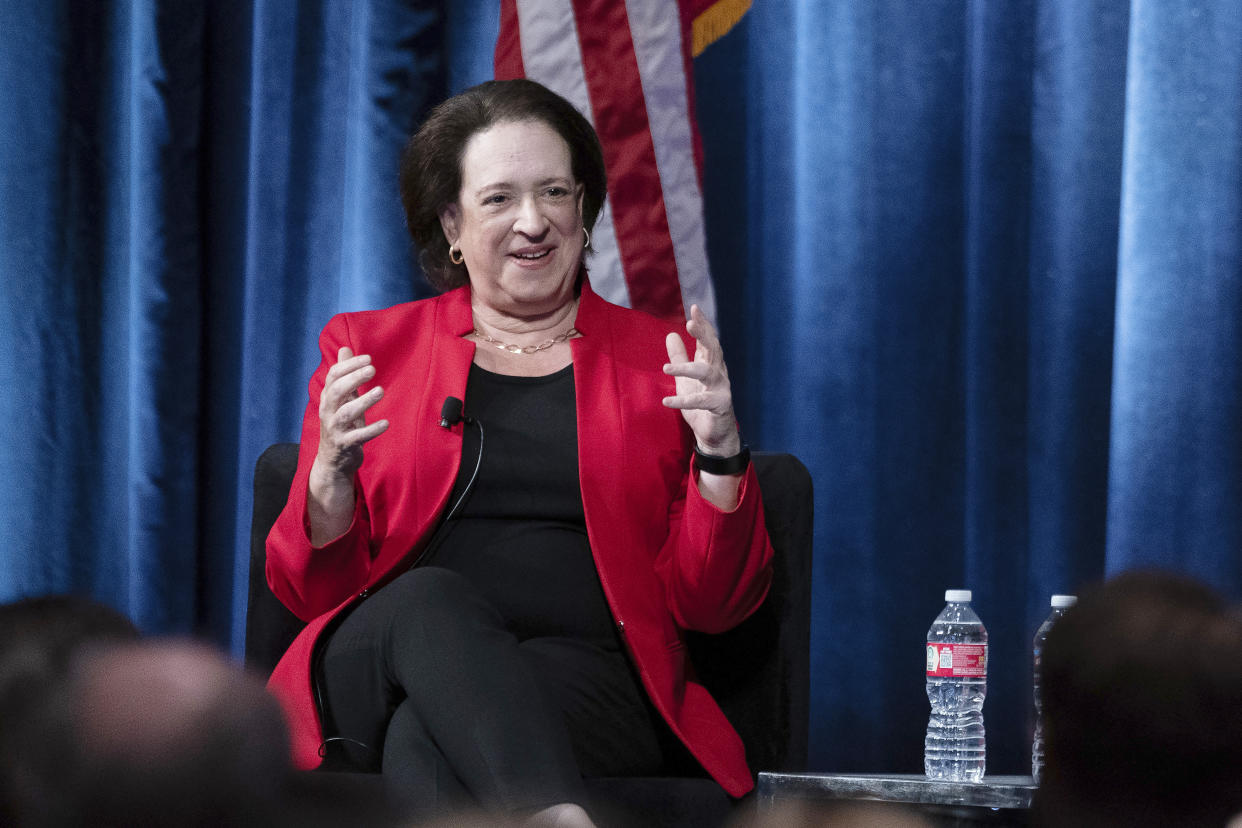Elena Kagan keeps pressing for ethics code enforcement at Supreme Court

NEW YORK — Justice Elena Kagan is keeping up her public drive for an enforcement mechanism for the Supreme Court’s ethics code despite strident criticism from some voices on the right and skepticism about it among some legal ethics scholars.
“It seems like a good idea in terms of ensuring that we comply with our own code of conduct going forward in the future. It seems like a good idea in terms of ensuring that people have confidence that we're doing exactly that,” Kagan said during an appearance Monday at New York University School of Law. “So, it seems like a salutary thing for the court.”
Kagan effusively praised the ethics code the high court adopted last November under intense pressure from Democratic lawmakers that followed a series of press reports about undisclosed gifts to some of her colleagues and behind-the-scenes efforts to influence the justices.
“I think it’s a good ethics code,” Kagan said, adding that some departures from rules for lower-court judges were justified by the Supreme Court’s unique role atop the judicial branch.
However, Kagan also defended her call — first issued at a judicial conference in California in July — for an external enforcement mechanism that could be overseen by retired or highly experienced judges. She scoffed at the notion that such a panel would be too deferential to the justices.
“Judges … they're not so afraid of us,” Kagan said. “I think that that's in the picking, basically. And I think that there are plenty of judges around this country who could do a task like that in a very fair minded and serious way.”
The Obama appointee also said she did not think such a mechanism would produce a flurry of frivolous allegations against the justices. The panel charged with enforcement could sort out meritless allegations, she said.
Kagan did not say whether her colleagues have privately discussed an enforcement regime or where they stand on it, although Justice Ketanji Brown Jackson said in a recent interview that she was open to it.
Kagan also declined to address a report in ProPublica that the the head of a conservative group that regularly brings cases to the high court, Kelly Shackelford of the First Liberty Institute, described earlier comments by Kagan on the subject as “somewhat treasonous.”
Kagan joked that the description sounded akin to being “somewhat pregnant,” but wouldn’t address it directly. “I don’t want to dignify it any further,” she said.
Shackelford wrote to Kagan Monday apologizing for the comment, First Liberty spokesperson Hiram Sasser said. “Kelly sent a letter saying he should not have assumed she was inviting other branches to control the court and he should not have used that word,” Sasser said.
Even as Kagan leaned into her call for the justices to adopt an enforcement mechanism, she did not repeat a suggestion she made last year that Congress’ power to dictate ethics rules for the court was well established.
“Can Congress do various things to regulate the Supreme Court? I think the answer is: yes,” she told a judicial conference in Oregon last summer. Her comment was a riposte to Justice Samuel Alito, who has said the Constitution didn’t give Congress power to dictate the court’s ethics processes.
On Monday, Kagan said she was steering clear of commenting on Congress’ power. “I don't want to say anything about that because, you know, one day, who knows, I might have to decide a case involving that,” she said.
Kagan didn’t explain or acknowledge the shift, but in July President Joe Biden and Vice President Kamala Harris — who is the Democratic presidential nominee — endorsed the notion of a law imposing an externally-enforced ethics code for the high court, as well as term limits for justices.
During an hourlong on-stage interview at a luncheon for a women’s legal leadership center, NYU Professor Melissa Murray asked Kagan about future consequences of the Supreme Court’s 2022 decision overturning the federal constitutional right to abortion. Justice Clarence Thomas suggested at the time that precedents guaranteeing rights to contraception and same-sex marriage might also someday be overturned under the same legal rationale.
“This analysis that you've just applied to abortion … it applies to a lot of other things,” said Kagan, who dissented from the court’s far-reaching abortion ruling two years ago. “Just as a matter of logic, that point is true,” the justice added, although she stopped short of saying whether she thought the high court would move toward repealing those other rights anytime soon, or ever.
Kagan also shared some details about the justices’ private pastimes, including that one topic of behind-the-scenes chatter at the court is golf. “Justice Kavanaugh is a good golfer and the chief justice is a good golfer,” Kagan said, adding that Chief Justice John Roberts’ wife, Jane Roberts, is “very good, too.”
Kagan said the shared interest in golf contributes to the court’s camaraderie, but should only matter to the public if it leads the justices to more give-and-take with their colleagues about the court’s official business. On that score, she was more opaque, saying: “The proof is in the pudding, right?”
